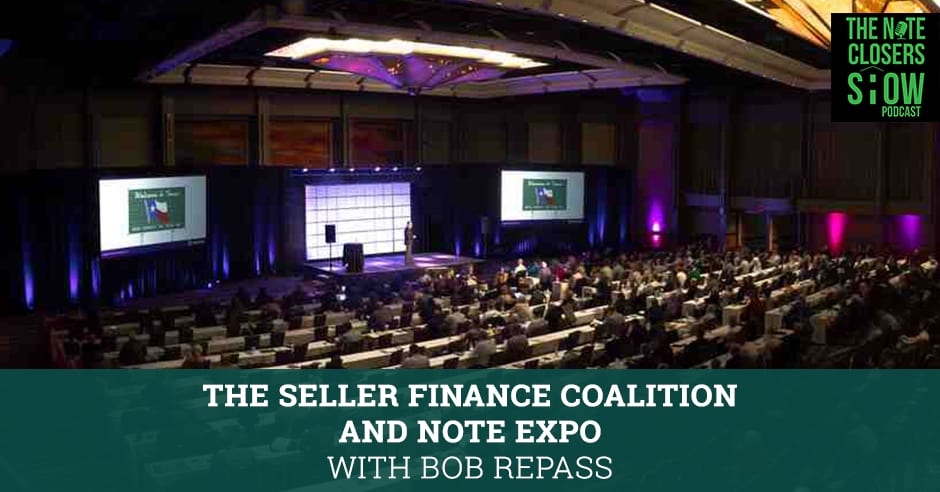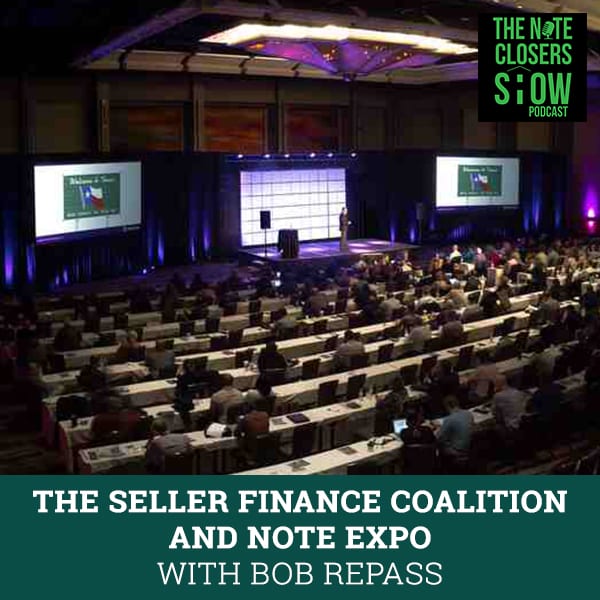
—
Listen to the podcast here
The Seller Finance Coalition and Note Expo with Bob Repass
We’re excited to have a special guest. We have the one, the only, Bob Repass from Colonial Funding to talk a little about seller financing and the upcoming Note Expo taking place in the first weekend of November. Bob, how’s it going from Dallas?
It’s going great, Scott. I’m glad to be here with you and I’m looking forward to it. We’ve got some exciting news to share.
For those who don’t know you, tell us about who you are, your background in the note space and what’s going on?
After college, I was in banking and consumer finance business. Then in 1990, I got on the seller finance space. Back in the day to resolve the institutional investors, I worked at all of them at one point in time. I started off my career working for Metropolitan Mortgage in the early ’90s. Then in 1997, I moved to Dallas because I came here to run the operation for the associates. In 2001, I ran the operation for Bayview and we ran that through 2012. I’ve seen more of seller finance notes than I can sleep at night. Then in 2013, I came over to Colonial Funding group. We started our capital fund here and we’re buying notes and servicing notes and working our way through them.
You’ve seen a few changes in the last few years?
I started in 1990 and here we are in this year, we’ve seen ups and downs. We’ve seen high-interest rates, low-interest rates, easy credit, hard credit. Seller finance has always been an interesting product. It serves a great need for folks wanting to be homeowners who typically can’t get traditional bank financing or maybe the property is not traditionally financeable. I’ve been passionate about it for the last 28 years. You wouldn’t be in something this long if you weren’t passionate about it.
Especially with the education stuff like that. You see a lot of people come into the space and get excited about it, but then they dwindle off after a year. They don’t understand this is a business model and it takes a little time to get things to rock and rolling. If you’re going to be in real estate, there’s nothing like being on the paper side and doing it for a long time.

Seller Finance Coalition: If you don’t have a seat at the table, then you’re on the table.
We deal with a lot of real estate investors trying to introduce them to the paper part of it. I don’t know if you had the same feeling, but it’s much better to be the one receiving the payments of being a landlord than having to fix the toilets. It’s super exciting and we do see people come in and out of the business. You’ve got to be in it for the long haul. It’s not a get-rich-quick kind of thing. It’s a business. You’ve got to work your way through it. There are going to be hot markets and there are going to be cold markets. There are going to be good times and down times. You’ve got to be in it for the long haul and you’ve got to be adaptable. You’ve got to know which niche is working at what time and which one to go chase.
I want people to think that there’s always money-making money in paper whether it’s a bull market or a bear market. You’ve got to know which niche to work in the best. I start creating owner finance notes and wraparound mortgages. Then when everything hit the fan in 2008, I flipped over to the nonperforming side. We still look at some owner finance paper here but mostly focused on non-performing. You do a mixture of both as well. Having a lot of paper investors do a little mixture of both, which is great. There has been some legislation and a lot of people are curious about what’s going on in the owner finance realm of licensing and what the Federal Government does. You’ve been a big part of that in spearheading and working with a lobbyist and things like that. Do you want to talk a little about what’s going on with the Seller Finance Coalition?
We started the Seller Finance Coalition back in 2014. In 2008, 2009 and in 2010 when the Dodd-Frank legislation was passed, all of a sudden, we’ve got swept up under all these rules and regulations and how that was going to affect our business. At that point in time, we didn’t have a seat at the table. As they say, “If you don’t have a seat at the table, then you’re on the table.” We ended up being on the table and the umbrella came over and it fell. The banks were going to have to follow these regulations then the individuals doing seller financing were going to have to do it as well. We went from being an unlimited number of transactions that you can do in a year to limiting to three.
First, the CFAT came out, reduced it to five, then Dodd-Frank came out, reduced it to three. We’ve been working to try to get that increased. As everybody knows, trying to get something done in DC with all the gridlock is frustrating. We’ve had a bill in the last few sessions to at least increase it to 24 in a twelve-month period. We feel like a lot of the mom-and-pop small time investors will get that regulatory relief not having to go through the licensing and the audit. If you did more than that, then you’re a full-time operation and you can afford to comply. We’ve been working through that. It’s in the Financial Services Committee now. Hopefully, it will get through the markup session.
Chairman Hensarling is trying to get a few things done. He’s not going up for reelection, so he wants to get a few things before he gets past and through before. I’m sure if you watch TV or whatever, there are a lot of other exciting things going on politically. I’m afraid we’re going to wrap this session, will have to reintroduce the once midterm elections. SellerFinanceCoalition.org is where folks can go to. See all copies of the bill, find out who your congressman is, how you can help and the grassroots effort and things like that. I’d love for everybody to go there and check it out.
It’s important for everybody especially if you’re in the note space to go on there. No offense, donations are needed to help keep any type of lobbying. You’ve got to help grease the wheels and get paid for attorneys and people go out and take a look at it. I highly recommend going in there. I’m an annual sponsor to it out there as well. We have a few of our students do it. To our audience, go out and check it out. If you’re looking at seller financing or if you’re in the note space, it’s something that we would need to come together on to talk about it. Eddie and I were talking about this at the Quest Expo about making sure getting everybody on board. All the different educators, all the different people teaching note space are out there making deals happen coming together, uniting behind a common front and doing this and getting some people out there. Jeff Watson is a big advocate of it as well. He’s been a big help for that too.
He’s one of our Cofounders and along with his role as the general counsel for the National REIA clubs. He’s got all those real estate investors across the country. He keeps those involved. The people are the power. All you have to do is reach out to your representative. Once they hear from their constituents, you wouldn’t believe what the difference that it makes. It’s telling the story and it’s not just the story from small business operators like us, but it’s how it affects the consumers and their ability to be homeowners and how it can help transform and stabilize neighborhoods. The banks aren’t going to lend in certain areas. They don’t make a lot of loans under $100,000. One thing Dodd-Frank did was limit the amount of money and points that they can charge, and they just can’t make enough money to make an $80,000 or $70,000 loan. It either becomes a rental property or you have to have seller financing. That seems to resonate once everybody sits down. It shouldn’t have fallen under that umbrella. We know that’s why we’re here. We’re trying to get a little relief and all that.
What has been your biggest a-ha moment? is it once people reach out to the reps and senators, then there is the response to the change in mentality?
It would have to be the people not wanting to do it because they don’t want to agree with somebody on the other side of the aisle. When you talk, “I understand. We understand how it affects our community,” but I don’t see us doing anything to change Dodd-Frank. It’s like, “We’re not going to do it right now.” It’s sad because people are getting affected and you go in and everybody is saying, “We want something bipartisan. We want to be able to hang something on the wall to say we got a victory and we worked together.” Getting across that finish line, you get close, you get to the committee and then all of a sudden it’s like, “Let’s look into this,” and they want to tweak it. It’s frustrating.
Everybody, Republican, Democrat, they’re always very open to listening to you. They say they understand and that but when it gets to crunch time and you’re not there anymore and you’re all behind the committee door, and they’re doing it. They can’t seem to all check the box. It’s not just on the Seller Finance or the Financial Services Committee, it’s that way all across the board. That’s the environment that we’re in right now. Unfortunately, the more I learn about it, I see it’s going to be the environment for the next couple of years if not, going forward for a while. Sooner or later they’ve got to realize that these lifetime politicians, they’ve got to make some decisions. They can’t go up there. Sometimes in my mind, they get caught up in being a politician and forget we’re supposed to be representing the guys back in Austin, Dallas, Iowa or wherever they’re from and not get on the soapbox sometimes and stop things.
We wish they would work it out as fast as other people here locally. You are doing a great job. We look forward to hearing from you. You have an amazing event coming up. Is this the fifth time for the Note Expo?
This will be the fifth Note Expo and we’re excited. When we set out to create this concept of Note Expo, we wanted an industry event, everybody from across the industry, not just note investors but real estate investors. Anybody entrepreneur who wants to learn more about the note space, we wanted to bring the community together. It has always been the first weekend in November, this year is Friday and Saturday, November 2nd and 3rd. It’s here in Dallas at the Renaissance Hotel. Anybody can go to NoteExpo.com and find out all the information they want.
Over the last few years, we’ve had over 500 attendees. We have a great lineup of speakers, sponsors and vendors. We always focus on two things. If we feel we’re going to have a successful conference, we want to make sure we have great content and we set up a great environment for connections. I’m always with content and connections. We go to conferences all the time. If you want to learn something, hear something important and you want to be able to make connections. I’m the one who usually puts the agenda together and lines things up. I always keep those two things in mind. Create an environment. If you’re spending your money and going to an event, it’s getting more and more virtual where people don’t want to have to go. If you’re going to make somebody go and fly to Dallas and stay at the hotel for a few nights, it’s got to be impactful for them.
We’re going to have great industry speakers there. We have a variety of formats. We do panel discussions and breakout sessions. One thing, I’m super excited about on Saturday the whole morning, we’re going to have a series of TED Talks. Instead of having somebody up there talking for 45 minutes or an hour, we’re going to do a TED Talk. It’s usually eight to twelve minutes. They’re going to be entrepreneurial in spirit, motivational, inspirational work, life balance, how note businesses impacted you, how do you run a business and still have time to do all that?
We’ve got a great lineup of some guys that I’ve known over the years. Some have been in this space a long time. Some are relatively new and they’re going to share their stories on how they do it. I’m looking forward to that. It was an idea that podcasts and TED Talks are pretty popular. Everybody’s attention span is getting shorter and shorter. You see a guy up there with a PowerPoint presentation for an hour, sooner or later you can look out in the audience and go, “They dialed it out.” If you can get them for ten or twelve minutes, you can pound it right quick, get them juiced up and they’re ready for the next one. We’ve got folks like Jeff Watson and industry experts. To go back to our Seller Finance Coalition, we always have a regulatory update. We have our lobbyist from DC coming down. Some of us from the Coalition will do a small panel and tell everybody where we’re at, what we’ve accomplished in the last year and stuff like that.
We’ve got some great sponsors and vendors. If you’re in the note business, you’ve got to know servicers and asset management companies. We’ve got the FCI, Security National and Ally. We’ve got National Asset Advisors. A new company, AHP Servicing of Chicago, they’re going to be there. All the self-directed guys: Quest, Equity Trust and IRA services. The connection is twofold. You want to get in front of all your vendors and servicers. Then you want to mix and mingle with the other 500 likeminded entrepreneur and investors. Everything is always in the exhibit hall. All the breaks, lunches, cocktail parties, you’re there. All the sponsors who have helped us put on the show spent a lot of money so we make sure that the audience is there. You can mix and mingle. That’s what it’s all about. Content and connections.

Seller Finance Coalition: More and more real estate investors are understanding that you’ve got to diversify.
You bring in a lot of vendors and a lot of people. You are cracking up there and all these small things. Everybody wants to be a guru. Everybody wants to put on their own events and stuff like that and it waters down the message of what’s going on out there. That’s one of the things that we’ve promoted with you guys or talked about and our audience too. I joked about this term being the hell freezes over episode because a lot of people are like, “What? Colonial and We Close Notes are getting together and do a webinar?” I’m like, “Yes, why not?” It’s on some good stuff. Eddie and you teach one thing. We teach a little bit different. We have a little bit of crossover, but you stick in your lane and we stick pretty much in our lane too. The beautiful thing about Note Expo is that I’m a big believer in exactly what you said, C and C, content and connections. That’s what it comes down to. This is still a very small space out there compared to the fix and flip side, to the wholesaling side. How many true owner-financed note investors or how many non-performing distressed note investors do you think are out there?
We’ve had over 500 and some of them had been in the space for a long time. Some of them are new to the business. They’re there to learn. If somebody buys their first note and they’re like, “I’ve got to find a servicer, I only have one note. I have to service with somebody else. I’m not happy with them.” You can call up five different ones or you can go to a conference where they’re all at and have face-to-face meetings with them. More and more real estate investors are understanding you’ve got to diversify. It’s like our capital fund. We started out at 50/50 performing and non-performing. Then all of a sudden, the reperforming loans started to hit the market. As a fund manager, you like that cashflow coming in.
We started getting more and more of the RPLS that we’re taking down, then we focused on buying some newly originated seller financing. We think there was some progress being made. There were more and more of that that’s being created so we’re doing that now. Our blend is 70% performing and 30% distressed assets. You can’t just say, “I’m going to go into the note business and all I’m going to buy are performing ones,” because some of them get non-performing. You have to know the non-performing space and to work out strategies. Then on the flip side, your specialty, focusing on non-performing, you’ve got to know how to have workout solutions. One of which is creating owner financing and putting a new borrower in there. Then all of a sudden, you have a performing loan. It’s both sides of the equation. We have folks who are still landlords. They’ll have some rental houses and they’ll loan some notes. It’s that true entrepreneurial spirit that attracts folks to the Note Expo. They like to share their stories. They’re not the only ones who have succeeded or failed on certain transactions. It’s hard to be in business when you’re working by yourself all day, but at least you can go to conferences like this. You get out there or listen to a podcast or virtual classes and you’ll realize, “I’m not in this alone and there are resources that I can bounce ideas off.” That’s part of the beauty of it.
I’m going to add a third C to your thing, community. The note space is a small community. Connections are great and I totally agree with that. The community is where a lot happens. The three Cs. Content is important to learn and then connections for vendors. I think a community, knowing who to talk to if something goes awry or being able to reach out to people, that’s what you get from networking more than anything else. We all have that crap moment sometimes, especially when you’re brand-new like, “This happened. What do I do now? Who do I turn to now?”
For the most part, most people don’t find notes in their own backyard. If you go to these kinds of events and you meet somebody in Kansas City and then all of a sudden you buy a note in Kansas City and something goes sideways, you’re going to call up Scott in Kansas City and say, “Can you do me a favor? Can you ride by there and see if anybody lives in there anymore? Can you snap a photo of it for me?” Maybe that’s even in the due diligence states. Maybe you’re looking at an asset in Columbus, Ohio and you’re like, “I just met Justin from Columbus the other day,” and then it’s a give and take. When they call you and say, “Scott in Austin, can you go right by there and take a picture then?” That’s the community factor that you’re talking about. There’s no secret sauce. Everybody knows what your lane is, our lane, whatever lane. The bottom line is, we want everybody to be successful. That’s why on the TED Talk, you’re going to see a wide diversity of people, but you’re going to see all of them sharing similar stories and ideas. Some from the corporate world, some came right to be an entrepreneur right out of high school. Everybody’s got a different story but they’re all on the same journey.
Bob, what do you think the biggest you see note investors, especially the brand-new, make out of the gate?
A lot of times their box is too small. They miss opportunities because they’re like, “I only want this yield. I only want this certain payment. I only want this particular market.” We’ve got an online trading platform, Notes Direct. We talk to people for feedback all the time and people go, “I didn’t see anything in zip code 28501,” and I’m like, “That’s your box. I can tell you’re going to have a hard time.” Other than that, their main struggle is raising capital. We have a lot of people where they’ll buy three or four notes and then they’re out of capital. Then you’ve got to figure out how do I recapitalize? You can either sell part of your loan or you can go out and develop some private investors and raise capital. That’s probably one of their main struggles in the note business is, “Where do I get the capital?” Sometimes it’s easy for a fix and flipper to get a hard money loan or something like that. They’re like, “I can’t go borrow the money here. I can’t borrow money to buy a note,” where there are ways to do that as well. One of their main struggles is the continual ability to raise capital.
That’s a mind block for most people because they come out of the corporate world. They’re used to having to use their own funds, their own retirement accounts or other cash they’ve saved. It’s the idea of having to ask it but often I want to go prove concept first before reaching out to my audience. They don’t know how to market because they never had to do that before.
Going back to the community, when you hang out with people at these events and you find out that this guy went to this meetup and then he met a few dentists and the dentist said, “I’m tired of the stock market. I’d be glad with an 8% return.” All of a sudden, the light bulb goes off. You don’t have to be a fancy pitch guy from the front of the stage. Some people ask for a gift they’re great at. Sometimes when you raise capital through that sit-down connection and Scott told me you were interested in this and then it’s a referral thing. Once you get one guy on and it works well, he’ll tell you about his buddy down the street that needs to do the same thing.
Good news travels fast when people are looking for opportunities to put their money to work and get their 401(k) back to a 401(k) or get money out of their certificate of disappointment with something that’s making sense for them versus percentage of an interest rate.
You read the paper or watch the news and all the stock market is saying all the time is high and all that service is comfortable. That’s great. I’m not saying take all your money out of the stock market. If you want to keep somethings there, that’s your individual choice but it’s going to go down. I’ve told a lot of folks, wait until the day after the midterm elections and see how the market reacts. It can go up, down, stay the same and then you’ve got a two-year presidential campaign again coming up. It’s always going to be a rollercoaster. The note business is an imperfect business. We’re not buying coupon clipping AAA paper because we’re buying them at a discount, but it is more after 28 years, a little more reliable return. If you know how to underwrite and you know how to do your own due diligence, even if something goes sideways, you know how to work your way out of it and go from there. That’s what the vendors, the servicers and the content can help you at a conference like the Note Expo.
Where do you see the housing market go in the next 12 to 24 months? Stuff is high but you’re also seeing market certainly soften up and Dallas is such a crazy market. I’ve been getting a lot of realtors calling me on stuff and how they’re listings are dragging us. Things not moving as fast as it used to in other parts of the country as well.

Seller Finance Coalition: Good news travels fast when people are looking for opportunities to put their money to work.
There are hot markets and there are flat markets and then there are markets that haven’t recovered from the recession of ’08, ’09. Our particular niche has always been sub $150,000 properties. On one hand, they don’t tend to fluctuate quite as much. If you’ve got a $60,000 house, it’s not going to go up to 90 and back down to 30. You’re going to stay there. It’s a blue-collar working neighborhood type of asset. Some of those communities got hit hard in the economy. When you deal with those types of assets, it’s paycheck-to-paycheck people, blue-collar neighborhood, one of the two spouses loses their job, their income goes down and so forth. It’s like Seattle, Portland and San Francisco, if you buy there you’re nuts. They’re all on fire and it isn’t going to stay that way forever. It will go down and it will bounce back up. There are certain markers. My daughter lives in DC. We looked at some DC properties and there were some neighborhoods that used to be bad. You tell us about where you live and they’re like, “Are you kidding me?” That was years ago. Now, it’s million-dollar condos and above or whatever.
I remember the dollar days in DC back in the day. When I had to buy a house for a dollar, I had to do something with it in five years if I remember correctly or three years.
Now, it’s back. That’s not to say there will be neighborhoods that will go down but not in DC. It’s a strong neighborhood. Detroit and Cleveland, those still haven’t really bounced back.
Columbus is hot and Indianapolis is hot, so you’ve still got plenty of those secondary markets around the bigger cities that had been slower to come back. Especially when you have the big three, the auto industries and stuff doing well, those neighborhoods do well. Those plans are doing well. It’s interesting seeing also though on what’s happening in other cities with the tariffs and what’s going on in the trade wars that are affecting smaller companies and affecting smaller markets though too, right?
Yes. I was reading an article about how the recovery from Hurricane Florence, which was going to be impacted by the tariffs and things trying to get the supplies in and things they need. That is something to keep your eye on. In Houston, we had a big flood and Puerto Rico had the hurricane as well. A lot of those areas are still not fully recovered. There are natural disasters. You always have to keep your eye on how that affects the overall housing. It helps some of the temporary housing because these people that got displaced have to find a place to go and whether that’s multifamily or things like that. That will have an impact on some of the housing numbers as well.
If there’s an opportunity there, you can reach out and help everybody. You also have to be careful of when you’re looking at underwriting, when you’ve been buying in those areas. Making sure you’re having a drive by and make sure you’re having a second set of eyes to look at it before or after the hurricane so you’re not buying an empty slab warehouse that once stood on Google Maps.
You’ve got to do your due diligence. If you’re an active note investor out there and you had properties in North Carolina or South Carolina, now that the storm has receded and with the waters, you need to have your servicer or asset manager get some property inspection, get somebody to check it. If necessary, get ready to file a claim, whether it’s for the insurance or FEMA or whoever. Don’t just sit back and hope somebody is going to tell you one day what happened. You’ve got to be a little proactive out there.
You’ve got to get on your horse and get people to take a look at that stuff, so you know where it sits at. You can either get it fixed and take advantage of or avoid mold sitting in and other things kicking in.
One of the panels, we always have a Note Expo’s default management. We’ll have servicer, asset managers, default attorney. This year, one of the topics we are going to cover is the impact of Hurricane Florence and how that impacts an individual investor. “What do you do? Why do you wait for somebody else to do it?” My advice to everybody is you own the asset, you’re the investor, you’ve got to take the point. Protect your investment and go from there. We’re going to beat that up a little bit as well. We also have a great self-directed IRA panel come up with some great ideas. We’ve got Nathan from Quest and Jeff Watson and some folks from Equity Trust. We always have fun. They try to be more creative than the last. One of the questions we always ask is, “What was the most creative thing that you saw?” Then the next question was like, “What’s the biggest fish you caught?” Everybody is going to catch one bigger the next time.
The Note Expo is on November 2nd and 3rd up in Dallas at the Renaissance. You can get your tickets at NoteExpo.com. Do you have some early bird ticket sales? Are they still on? When do those expire?
It’s $399 to attend, $249 for a guest. That goes through October 15th. The last two weeks before the event, you’ve got to raise the price there and get your head counts down. We’re on track to having more than 500 folks again. We have the ability and the space to hold a few more than that. If you’re ready to go, don’t hesitate. Take advantage of the pre-event pricing. I want to see you in Dallas.
We’ll be there. We’re glad and excited to be there. We’re looking forward to networking with everybody else who will be there. We’re glad to hopefully help you beat that 500th mark and get it up to 600 so we can do that for you.
That sounds great and I appreciate it. Hopefully, you can join us.
Bob, thanks for joining us here on the podcast. We appreciate it and we look forward to seeing you up in Dallas.
I wanted to congratulate you for doing a great job on the podcast. I see it all over social media. You’re doing good stuff for the industry so keep it up. Keep spreading the word about Seller Finance Coalition and that good stuff as well. Thanks for inviting me on. Hopefully, I can be back sometime and we’ll beat it up again.
Thanks for the kind words. Go out there. If you’re a brand-new investor or even a seasoned investor, Note Expo is one of those places that you want to put on your calendar every year. We’ve had it on our calendar and it’s a great place. It’s one of the few events that we promote outside of ours as one of the must-attend events if you’re a true note investor. There are very few other places where you’ll get as many vendors or meet as many people doing it. The fact that it’s in the middle of the country in Dallas, it makes it easy for everybody to come from the East Coast, the West Coast, North and South together centralized. Take advantage of those early bird tickets at NoteExpo.com. They’ve got a room blocked over there at the Renaissance Hotel. It’s an affordable place plus they’re going to feed you there while you’re in Dallas, which is always great. Take a look at it. Get signed up and we look forward to seeing you in Dallas. We’ll see you all at the top.
Important Links
- Colonial Funding
- Seller Finance Coalition
- SellerFinanceCoalition.org
- NoteExpo.com
- Quest
- Equity Trust
- IRA services
- Notes Direct
About Bob Repass

Bob Repass is a 25-year veteran and expert in the seller finance mortgage and distressed asset industry. Over the course of his career, he has purchased over 40,000 performing and non-performing mortgage loans totaling over $2 billion dollars in volume, giving him an unparalleled track record in the industry. Mr. Repass most recently served as the President of Pathfinder Equity Holdings, LLC a mortgage consulting, loan trade advisory and real estate investment firm whose focus is to assist clients in realizing the maximum potential on their investments by improving acquisition returns, as well as loss mitigation and exit strategies. Mr. Repass currently serves as Managing Director of Colonial Funding Group, where he shares overall responsibility for the management of the firm. In his role as Managing Director, Mr. Repass’ primary focus includes investor relations and regulatory compliance.

